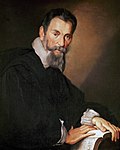Wikipedia:Today's featured article/requests/Claudio Monteverdi
Claudio Monteverdi[edit]
- This is the archived discussion of the TFAR nomination for the article below. Subsequent comments should be made on the appropriate discussion page (such as Wikipedia talk:Today's featured article/requests). Please do not modify this page.
The result was: scheduled for Wikipedia:Today's featured article/May 15, 2020 by Ealdgyth (talk) 14:44, 30 April 2020 (UTC)
Claudio Monteverdi (15 May 1567 – 29 November 1643) was an Italian composer, string player and maestro di cappella. A composer of both secular and sacred music, and a pioneer in the development of opera, he is considered a transitional figure between the Renaissance and the Baroque periods of music history. He was a court musician in Mantua (c. 1590–1613), and then maestro di cappella at St Mark's Basilica in the Republic of Venice. His surviving music includes nine books of madrigals, in the tradition of earlier Renaissance polyphony—but also experimenting with the basso continuo technique, distinctive of the Baroque—as well as large-scale sacred works and three complete operas. His music (for example Vespro della Beata Vergine (Vespers for the Blessed Virgin)) enjoyed a rediscovery from the 1880s onwards, and he is now seen as a significant influence in European musical history. Seven of his operas have been lost, but his L'Orfeo (1607) is the earliest opera still widely performed. (Full article...)
- Most recent similar article(s): March 18: Arnold Bax, different period, different nationality
- Main editors: Smerus, Brianboulton
- Promoted: 2017
- Reasons for nomination: composer's birthday
- Support as nominator. Gerda Arendt (talk) 18:31, 4 March 2020 (UTC)
- Support – Looks good to me. --- C&C (Coffeeandcrumbs) 23:30, 7 March 2020 (UTC)
- Support satis. – John M Wolfson (talk • contribs) 22:57, 15 March 2020 (UTC)
- Comment Could eliminate repetition: "His music, including Vespro ...". Jmar67 (talk) 12:24, 7 April 2020 (UTC)
- Support Extremely thorough and informative. Aza24 (talk) 21:52, 8 April 2020 (UTC)
- Support Fancy article. «“I'm Aya Syameimaru!”I„文々。新聞“I„
userbako”» 19:34, 15 April 2020 (UTC)

